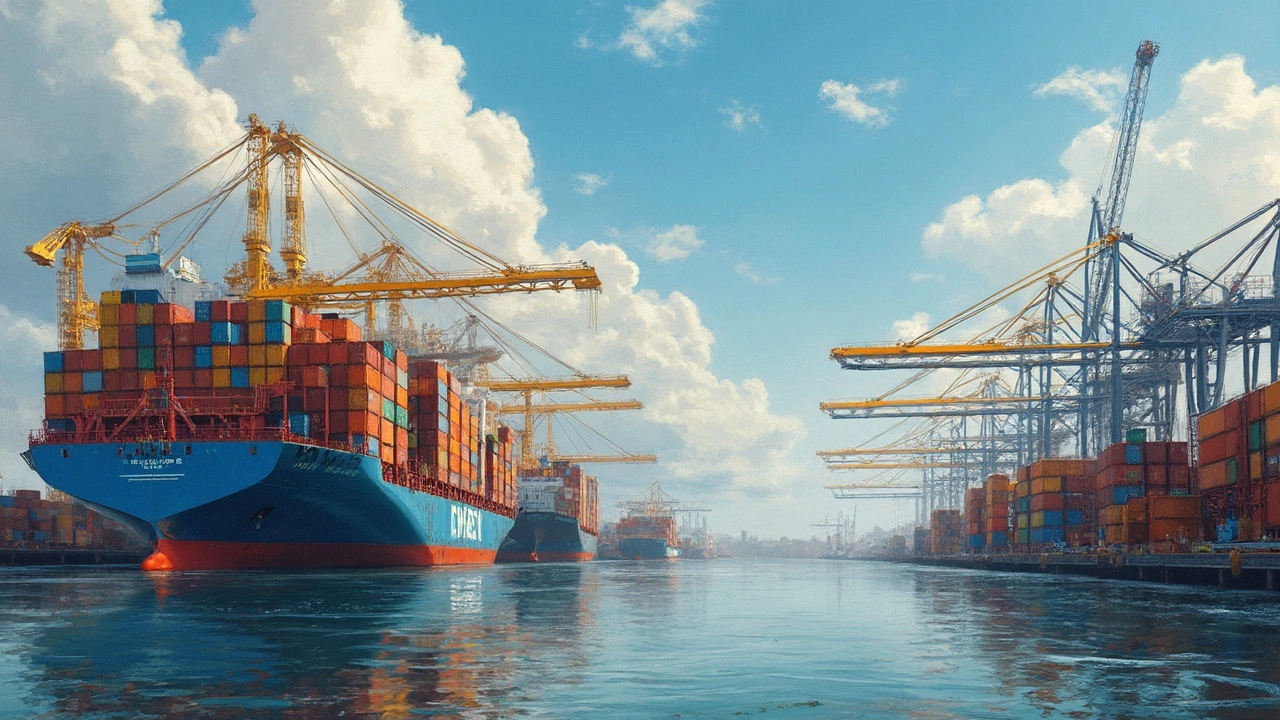Shipping stuff overseas? Sounds like a big undertaking, right? Don't worry, you're not alone in feeling that way. Shipping internationally, after all, involves more than just putting something in a box and sending it off. There are different methods, and knowing which one to choose depends on various factors like the size of your cargo, how fast you need it to get there, and, of course, the cost.
First off, you have two big players in the shipping game: air freight and sea freight. Air freight is your go-to if you're in a hurry but beware, those quick flights can get a bit costly. On the flip side, sea freight may be slower, but it's usually lighter on the wallet. If what you're shipping isn't too time-sensitive, going by sea can really save you some bucks.
Then, there are courier services, like the ones you use for holiday gifts but on a global scale. They handle all the finicky details—like paperwork and customs clearance—which makes them super convenient, especially for smaller packages. Think of them as the all-inclusive resort option of shipping.
- Understanding Air and Sea Freight Options
- The Role of Courier Services
- Factors Influencing Your Shipping Decision
- The Importance of Insurance and Tracking
- Customs and Regulatory Challenges
Understanding Air and Sea Freight Options
When it comes to international shipping, you're probably going to lean towards either air or sea freight. Each has its perks and downsides, and grasping the differences can save you both time and money.
Air Freight: Speed vs. Cost
If time's of the essence, air freight is usually the way to go. We're talking about fast delivery times—sometimes within a few days. This makes air freight the preferred choice for those last-minute shipments or perishable goods that can't afford delays. However, remember that this speed comes at a price. Air freight rates are calculated by both weight and volume, and they can add up pretty quickly.
Sea Freight: Volume is King
Got a lot to ship but not in a rush? That's where sea freight steps in. It's an ideal choice for bulkier items or when you're shipping massive quantities. Sea freight is generally cheaper than air freight, mainly when measured by volume, not weight. But here's the trade-off—it can take weeks to reach its destination, depending on the route and the ports involved.
Making the Choice: Factors to Consider
So, how do you decide between air and sea? Consider these factors:
- Time: How urgently do you need your shipment at its destination?
- Cost: What's your budget for shipping?
- Volume and Weight: Are you shipping light, small packages or heavier, bulk items?
- Nature of Goods: Are your items perishable or particularly time-sensitive?
Getting a handle on these elements helps you choose what fits your needs best, ensuring you don’t end up overpaying or dealing with unnecessary delays.
The Role of Courier Services
When it comes to international shipping, courier services often come up as the reliable middleman you didn’t know you needed. These services, like DHL, FedEx, and UPS, are the MVPs for anyone needing a hassle-free shipping experience. Why? They pretty much handle everything for you, from door-to-door delivery to all the nitty-gritty of paperwork and customs.
Speed and Convenience
Courier services offer unmatched convenience and speed. If you've got small parcels or documents that need to move across the globe, they can deliver in as little as two to five days. They take care of package tracking and updates, so you're never left wondering where your stuff is.
Cost Factors
Let’s talk money. It’s no secret that using courier services can be more expensive than other options, especially if you’re shipping larger items. But here’s the kicker: the cost often includes value-added services like handling, packaging, and of course, speed. You’re basically paying for peace of mind.
Comprehensive and Safe
Safety is another reason to choose courier services. They provide comprehensive insurance, ensuring your items are covered if things go wrong during transit. This feature makes couriers a great choice if you're shipping valuable goods or important documents overseas.
Here's a quick breakdown of some popular couriers and their services:
| Courier Service | Average Delivery Time | Main Features |
|---|---|---|
| DHL Express | 1-3 days | Global reach, real-time tracking |
| FedEx International Priority | 1-2 days | Time-definite delivery, customs clearance |
| UPS Worldwide Expedited | 2-5 days | Delivery guarantee, detailed customs support |
In conclusion, if you’re looking for speed, security, and convenience, courier services offer a comprehensive solution. Sure, they might punch a hole in your wallet, but if time is money, they’re worth every cent.

Factors Influencing Your Shipping Decision
When you're figuring out the best way to handle international shipping, several factors come into play. It's not all about getting from point A to point B; there's more under the hood. So, what should you be considering?
Cost
This one's a biggie. You want to get your stuff where it needs to go without breaking the bank, right? Sea freight is often cheaper than air freight for bulky items. But remember, if you need something urgent, air might be worth the extra cost.
Speed
Got a bit of a time crunch? Air freight typically wins in the quickness department. Sea freight, while cheaper, is like taking the scenic route—slower but often worth it for heavy or non-urgent shipments.
Package Size and Weight
The size and weight of your package hugely impact your decision. No one wants to pay air freight prices for a container full of clothes, right? Seat on an airplane gets pricey real quick, but an entire container on a ship could work out just fine.
Destination Specifics
Sometimes, the destination itself affects your options. Not all shipping methods are created equal across the globe. Some areas might only get reliable sea service, while others zip through with air.
Tracking and Insurance
These two are kind of like your safety net. Good tracking keeps you updated on where your package is, and insurance gives you peace of mind. Courier services usually offer both, but if you go for freight, you'll likely need to sort these out separately.
| Shipping Method | Average Delivery Time | Cost Range |
|---|---|---|
| Air Freight | 2-7 days | $$$ |
| Sea Freight | 20-40 days | $$ |
| Courier Services | 3-10 days | $$ |
So, when you're weighing up shipping options, think about what matters most to you—whether that's cost, speed, or safety. Make the call that suits your needs, and your package should arrive without any hiccups.
The Importance of Insurance and Tracking
When it comes to international shipping, insurance and tracking play major roles in making sure your package safely reaches its destination. Imagine sending something valuable overseas—losing it or having it damaged could be a nightmare. That's where shipping insurance comes into the picture.
Why Insurance Matters
Getting insurance on your shipment means you're protected financially if something goes wrong. It usually covers loss, theft, and sometimes even damage. This is particularly important if you're shipping high-value items or business-related products. The cost of insurance often gives you peace of mind, knowing that you won't be completely out of pocket if the shipment goes awry.
Many shipping options offer varying levels of insurance, so it's a smart move to understand what each policy covers. Some companies may include limited insurance in their standard rates, while others might offer it as an extra option. Check the fine print—better safe than sorry, right?
The Role of Tracking
Tracking is your eyes and ears once the package leaves your hands. Real-time tracking systems let you keep tabs on where your package is at any moment. It helps you and your recipient plan around its arrival without any guesswork.
Most courier services provide tracking numbers as soon as the shipment is dispatched. These can be entered into their websites for updates. Many service providers even send notifications via email or text, keeping you in the loop without effort from your side.
Tips for Choosing Insurance and Tracking
- Always compare the insurance options offered by different carriers. It's worth the extra minute or two it takes.
- Consider the value of what you're shipping. A pricy item might need more coverage than what’s standard.
- Use tracking options to keep both you and the receiver informed so there are no surprises when the package arrives.
In short, don’t overlook the importance of insurance and tracking. They’re like your security blanket and GPS for international shipping, ensuring everything goes as planned, giving you one less thing to worry about.

Customs and Regulatory Challenges
When you're dealing with international shipping, it's not just about getting your package from point A to point B. One of the biggest hurdles you might face is navigating customs and various regulations. Every country has its own set of rules, and what flies in one place might not in another.
First off, it's vital to know what's restricted or prohibited in the destination country. Some countries have strict bans on certain items, like electronics or food products, so always double-check before sending something off. You wouldn't want your package languishing in customs or, worse, getting sent back.
Documentation is Key
Papers, papers, and more papers! To ship successfully, you'll need the right documents like a commercial invoice, packing list, and specific certificates depending on what you're shipping. These documents let the authorities know everything they're dealing with and help determine tariffs or taxes. Messing up here can lead to delays or extra costs.
Understanding Duties and Taxes
Duties and taxes are another biggie. While you might think you're done after paying the shipping fee, many countries require import duties based on the item value. Knowing how these are calculated can save you and the receiver from unexpected expenses. A good rule of thumb? Always calculate these extra costs when budgeting for global delivery.
Helpful Tip: Use a Customs Broker
If you're shipping regularly or have a complicated shipment, consider using a customs broker. These pros know the ins and outs of different countries' regulations and can make the whole process smoother. They’ll deal with the nitty-gritty so you can focus on other things.
It's also worthwhile checking any free trade agreements which might apply to your shipments. These agreements can sometimes reduce or eliminate duties, making your shipping a bit more pocket-friendly.
Remember, taking the time to plan can save a lot of headaches later. Properly understanding customs and regulations makes your shipping options not just cheaper but a whole lot easier too.





